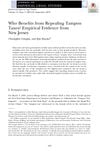
Search
for
Sort by
Research
600-630 / 1000+ results

research You Need a Makeover: The Social Construction of Female Body Image in A Makeover Story, What Not to Wear, and Extreme Makeover
Makeover TV shows promote unrealistic beauty standards and suggest women's worth is based on looks.

research Review of Aseptic Neutrophilic Dermatoses
The review says skin conditions with sterile pustules need more research for better treatments.

research Short-Term Responses of Soybean Roots to Individual and Combinatorial Effects of Elevated CO2 and Water Deficit
Elevated CO2 can lessen the negative impact of water shortage on soybean roots and affects specific genes.

research The New Paradigm for Androgenetic Alopecia and Plant-Based Folk Remedies: 5α-Reductase Inhibition, Reversal of Secondary Microinflammation, and Improving Insulin Resistance
Plant-based remedies may treat hair loss by reducing inflammation and improving insulin resistance.

research Who Benefits from Repealing Tampon Taxes? Empirical Evidence from New Jersey
Repealing tampon taxes helps low-income people the most by making menstrual products cheaper.

research Management of Cutaneous and Extracutaneous Side Effects of Smoothened Inhibitor Therapy for Advanced Basal Cell Carcinoma
The document concludes that side effects from Smoothened inhibitor drugs for skin cancer are reversible and can be managed with a team approach to maintain quality of life.

research Developing a Framework for Sources of New Product Ideas
The authors suggest systematically sourcing new product ideas from various internal and external places to improve innovation.

research What Ages Hair?
Hair aging and loss are caused by genetics, hormones, environment, and grooming, with treatments like minoxidil effective for certain types of hair loss.

research Essential Oil and Important Activities of Thuja Orientalis and Thuja Occidentalis
Thuja orientalis and Thuja occidentalis essential oils have medicinal properties useful for developing treatments with antimicrobial and bioactive effects.

research Tamoxifen-Induced Female Androgenetic Alopecia in a Patient with Breast Cancer
Tamoxifen caused hair loss in a 52-year-old woman.

research Menopausal Acne – Challenges And Solutions
Menopausal acne is treated with medications and lifestyle changes, but careful choice is needed due to side effects.

research Progesterone-Independent Neurosteroid Regulation of Alpha2-GABA-A Receptors in the Hippocampus Subfields
Progesterone and its byproducts control a specific receptor in the brain independently of progesterone receptors, affecting conditions related to the menstrual cycle.

research Flightless I Exacerbation of Inflammatory Responses Contributes to Increased Colonic Damage in a Mouse Model of Dextran Sulfate Sodium-Induced Ulcerative Colitis
High levels of the protein Flightless I worsen ulcerative colitis symptoms in mice.

research Acute and 30-Day Oral Toxicity Studies of a Novel Coccidiostat – Ethanamizuril
Ethanamizuril is safe for rats at 20 mg/kg feed, but higher doses cause hair loss, organ changes, and liver, kidney, and lung damage.

research Structure Optimization of Tetrahydropyridoindole-Based Aldose Reductase Inhibitors Improved Their Efficacy and Selectivity
Optimizing the structure of a specific compound greatly improved its effectiveness and precision for treating diabetic complications.

research Essentials of Hair Care Cosmetics
Hair care cosmetics affect hair health; know products, ingredients, and procedures.

research Hair Restoration in Androgenetic Alopecia: Looking Beyond Minoxidil, Finasteride, and Hair Transplantation
Alternative treatments show promise for hair growth beyond traditional methods.

research Nanocarrier Systems for Transdermal Drug Delivery
Nanocarriers could improve how drugs are delivered through the skin but require more research to overcome challenges and ensure safety.

research Nutraceutical and Functional Scenario of Wheat Straw
Wheat straw is valuable for its health benefits and various industrial uses.

research Androgenetic Alopecia in Policemen: Higher Prevalence and Different Risk Factors Relative to the General Population (KCIS No. 23)
Policemen have more hair loss due to obesity, sunlight exposure, and stress.

research Bone Mineral Density Is Unaltered in Women with Polycystic Ovary Syndrome
Women with PCOS have similar bone density to healthy women, but those who are obese have higher bone density at some body sites.

research Chromium Supplementation Does Not Improve Weight Loss or Metabolic and Hormonal Variables in Patients with Polycystic Ovary Syndrome: A Systematic Review
Chromium supplements don't help with weight loss or improve hormone and metabolism issues in people with polycystic ovary syndrome.

research Association Between Severity of Depression and Clinico-Biochemical Markers of Polycystic Ovary Syndrome
Depression severity is not linked to PCOS markers like BMI, insulin resistance, or testosterone levels.

research Preclinical and Clinical Studies Demonstrate That the Proprietary Herbal Extract DA-5512 Effectively Stimulates Hair Growth and Promotes Hair Health
DA-5512 effectively improves hair growth and health, performing better than minoxidil.

research Androgenetic Alopecia: Overview, Epidemiology, Pathophysiology, and Treatment
Various treatments exist for hair loss, but more research is needed for better options.

research A Non-Invasive Study of Alopecia in Japanese Macaques Macaca Fuscata
About 20% of Japanese macaques had head alopecia, and stress and environment might cause hair loss.

research Effect of Dietary Supplementation with INVERSION Femme on Slimming, Hair Loss, and Skin and Nail Parameters in Women
INVERSION Femme supplement helped women lose weight, reduce hair loss, and improve skin and nail health.

research Pilot Study of 15 Patients Receiving a New Treatment Regimen for Androgenic Alopecia: The Effects of Atopy on AGA
The new treatment regimen was effective in promoting significant hair growth in all 15 male patients with androgenic alopecia.

research Recommendations for Endocrine Treatment of Patients with Gender Dysphoria
The document concludes that hormone therapy is essential for treating gender dysphoria, with specific drugs and monitoring protocols recommended for safety and effectiveness.